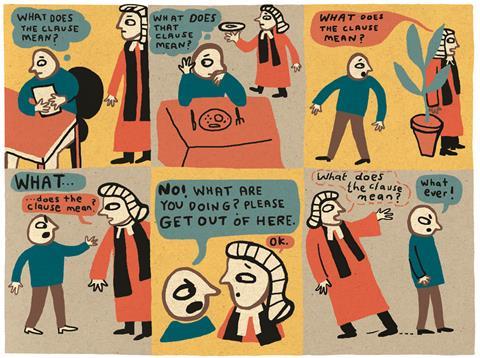When the same case came before the TCC and an adjudicator at the same time, one partyтАЩs barrister politely asked the TCC judge to go away. HereтАЩs what he decided to do instead

The adjudicator in this case had a question to decide - тАЬWhat is the meaning of a clause in the contract?тАЭ The judge in this case had the same question to decide. Both beavered away at the conundrum at the same time. Solicitors and counsel turned up at the adjudicatorтАЩs temple and argued. Same solicitors and counsel turned up at the judgeтАЩs temple and argued. Temples separately throbbed. In other words, the same issue was being тАЬadjudicatedтАЭ at the same time by a High Court judge and a construction contract adjudicator.
Solicitors and counsel turned up at the adjudicatorтАЩs temple and argued. Same solicitors and counsel turned up at the judgeтАЩs temple and argued. Temples separately throbbed
Odd? The barrister for groundwork contractor McGee Group thought so. McGee was in dispute with WW Gear Construction about its claim for ┬г2.5m, all to do with building the swish Westminster Park Plaza hotel in London. The barrister said that one of the dispute deciders ought to go away, and invited the High Court judge to leave.
Let me try to fathom whatтАЩs going on here. McGee and WW Gear are in their fourth adjudication. The pair learned a lesson last year in one of the earlier adjudications. The adjudicatorтАЩs 83-page award came out in favour of McGee, the groundworker, or at least in favour when it came to what certain of the JCT clauses mean. The loser in that adjudication promptly went off to the High Court for a final decision, and won.
Can you see what is coming with this fourth adjudication? It was another fight about the meaning of another clause. McGee came to adjudication again. So WW Gear defended but came at the same time to the High Court, with the same issue. Why? Because an adjudicatorтАЩs decision is only temporarily binding, until finally decided by the High Court. And if WW Gear could get the High Court to decide the meaning of the clause during the adjudication, that decision would bind the fourth adjudicator hand and foot.
Now, let me say this. There is huge wisdom in getting a High Court judge to decide тАЬiffyтАЭ points either before or during the adjudication. There is a guidance note on all this by the Technology and Construction Court. That court will move ever so fast to look at issues such as whether there is a right to adjudicate at all, what the scope of the adjudication is, and more besides. ItтАЩs a bit half-baked to burn midnight oil and burn holes in pockets on a pro-tem adjudicatorтАЩs decision when a truly arguable issue can be first, yes first, decided by the court. And if a clause can mean this, that or the other, then get it into the TCC and bring that binding decision to the adjudicator. The adjudicator then has a firm launch pad to decide the claims arising from the judgeтАЩs decision.
If a clause can mean this, that or the other, then get it into the TCC and bring that binding decision to the adjudicator
So, did the judge take the hint from McGeeтАЩs barrister that he should go away? No. But he did do something different. As to the TCC guide, the judge said it encouraged him to stay and hear argument, but there is a general principle that the TCC only considers intervention in an ongoing adjudication in rare cases. As to what might encourage or discourage the judge to intervene, counsel argued that the adjudicator should be left to get on with it free from intervention by the court: there should not be a second level of intervention in tandem because this is wasteful, not only of the partiesтАЩ time and money but of judicial resources. The right to adjudicate ought not be curtailed during the period when an adjudication is afoot.
Counsel has a point here. The judge could see that the courtтАЩs intervention might distract from the adjudication at a critical point. It might even interfere with the adjudicatorтАЩs ability to conduct the process fairly. So, the judge embargoed his decision on the substantive issue. The concern was that it might result in unfairness, misunderstandings or mistakes - not least because the parties might not have the right or opportunity to explain the implications of the judgment to the adjudicator.
From my position as an adjudicator, I would want this judgment to come to me immediately. Then I would expect an application to be made by one of the parties to bring it in. I would say yes, provided both parties extended time. And if one party refused there might still be time to deal with the judgment in the adjudicatorтАЩs decision. Might.

Tony Bingham is a barrister and arbitrator at 3 Paper ║┌╢┤╔ч╟Їs, Temple



























No comments yet